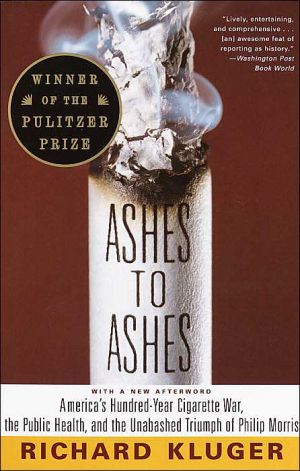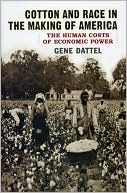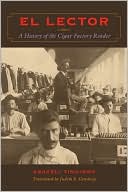Ashes to Ashes: America's Hundred-Year Cigarette War, the Public Health, and the Unabashed Trium ph of Philip Morris
Ashes to Ashes is a monumental history of the American tobacco industry: its awesome and ironic success in developing the cigarette, modern society's most widespread instrument of self-destruction, into America's most profitable consumer product: its energized, work-obsessed royal families, the Dukes and the Reynoldes, and their battling successors like the eccentric autocrat George Washington Hill and the feisty Joseph F. Cullman: its generations of entrepreneurial geniuses: its cunning...
Search in google:
No book before this one has rendered the story of cigarettes — mankind's most common self-destructive instrument and its most profitable consumer product — with such sweep and enlivening detail.Here for the first time, in a story full of the complexities and contradictions of human nature, all the strands of the historical process — financial, social, psychological, medical, political, and legal — are woven together in a riveting narrative. The key characters are the top corporate executives, public health investigators, and antismoking activists who have clashed ever more stridently as Americans debate whether smoking should be closely regulated as a major health menace.We see tobacco spread rapidly from its aboriginal sources in the New World 500 years ago, as it becomes increasingly viewed by some as sinful and some as alluring, and by government as a windfall source of tax revenue. With the arrival of the cigarette in the late-nineteenth century, smoking changes from a luxury and occasional pastime to an everyday — to some, indispensable — habit, aided markedly by the exuberance of the tobacco huskers.This free-enterprise success saga grows shadowed, from the middle of this century, as science begins to understand the cigarette's toxicity. Ironically the more detailed and persuasive the findings by medical investigators, the more cigarette makers prosper by seeming to modify their product with filters and reduced dosages of tar and nicotine.We see the tobacco manufacturers come under intensifying assault as a rogue industry for knowingly and callously plying their hazardous wares while insisting that the health charges against them (a) remain unproven, and (b) are universally understood, so smokers indulge at their own risk.Among the eye-opening disclosures here: outrageous pseudo-scientific claims made for cigarettes throughout the '30s and '40s, and the story of how the tobacco industry and the National Cancer Institute spent millions to develop a "safer" cigarette that was never brought to market.Dealing with an emotional subject that has generated more heat than light, this book is a dispassionate tour de force that examines the nature of the companies' culpability, the complicity of society as a whole, and the shaky moral ground claimed by smokers who are now demanding recompense Michael Ross Warnings, bulletins and cautionary tales about the dangers of cigarette smoking have combined scare tactics and semi-friendly advice for years. But in Ashes to Ashes -- Richard Kluger's incisive, funny and altogether magisterial new book about America's love affair with nicotine -- we've finally got a book that chronicles the chilling rise of Big Tobacco, and puts our deadliest little habit into perspective as a phenomenon that colors virtually every facet of American business, culture and identity. Ashes to Ashes weighs in at a whopping 832 pages, but Kluger -- previously the author of The Paper, an equally detailed study of the celebrated New York Herald Tribune -- doesn't waste a word. We follow tobacco's history in America from its cultivation by English settlers in Virginia (unlike many products, it thrived in the porous clay soil and the quasi-tropical climate of the American South) to its status as a cash crop that rescued the southern states from the economic ravages of the Civil War. Just as notably, Kluger has a firm grasp on the myriad roles that cigarettes have played in our culture: as boredom killer; talisman for Bogie and Bette in the movies; the soldier's best friend. With a novelist's vivid characterizations and firm tone, Kluger's book examines the emergence f the major players of the cigarette industry. Yet the bulk of Ashes to Ashes is an exacting look at the rise of Philip Morris. The company has dramatically expanded its market share, most notably in 1954 when Marlboro (originally created as a woman's brand) was re-introduced. Thanks largely to Marlboro's success, Philip Morris went on to dominate the industry. Later, in the 1980s, it acquired companies whose products -- from beer to frozen vegetables -- would insulate it from the growing negative attention paid to the company's core business. To Kluger's credit, his journalism is shot through with humanity and more than a little compassion for smokers themselves. He uses sobering statistics and information (much of it never before published) rather than noisy emotion to reveal both the dangers of smoking and the wildly duplicitous positions the big tobacco makers have taken over the years. There's no good advice, the old saw goes, like a good scare. If Ashes to Ashes doesn't get you to quit, maybe nothing will. -- Salon
Foreword: A Quick Drag1Adoring the Devil's Breath32The Earth with a Fence Around It303It Takes the Hair Right Off Your Bean544The Golden Age of Malarkey805"Shall We Just Have a Cigarette on It?"1126The Filter Tip and Other Placebos1417The Anguish of the Russian Count1838Grand Inquisitors2219Marlboro Mirage26310Three-Ton Dog oil the Prowl29811Stroking the Sow's Ear34912Let There Be Light38713Breeding a One-Fanged Rattler41214The Heights of Arrogance44715The Calling of Philip Morris49016Of Dragonslayers and Pond Scum53617Chow Lines58018Melancholy Rose63919Smooth Characters67820Blowing Smoke723A Note on Sources and Acknowledgments764Selected Bibliography768Notes773Index791
\ Michael RossWarnings, bulletins and cautionary tales about the dangers of cigarette smoking have combined scare tactics and semi-friendly advice for years. But in Ashes to Ashes -- Richard Kluger's incisive, funny and altogether magisterial new book about America's love affair with nicotine -- we've finally got a book that chronicles the chilling rise of Big Tobacco, and puts our deadliest little habit into perspective as a phenomenon that colors virtually every facet of American business, culture and identity.\ Ashes to Ashes weighs in at a whopping 832 pages, but Kluger -- previously the author of The Paper, an equally detailed study of the celebrated New York Herald Tribune -- doesn't waste a word. We follow tobacco's history in America from its cultivation by English settlers in Virginia (unlike many products, it thrived in the porous clay soil and the quasi-tropical climate of the American South) to its status as a cash crop that rescued the southern states from the economic ravages of the Civil War. Just as notably, Kluger has a firm grasp on the myriad roles that cigarettes have played in our culture: as boredom killer; talisman for Bogie and Bette in the movies; the soldier's best friend.\ With a novelist's vivid characterizations and firm tone, Kluger's book examines the emergence f the major players of the cigarette industry. Yet the bulk of Ashes to Ashes is an exacting look at the rise of Philip Morris. The company has dramatically expanded its market share, most notably in 1954 when Marlboro (originally created as a woman's brand) was re-introduced. Thanks largely to Marlboro's success, Philip Morris went on to dominate the industry. Later, in the 1980s, it acquired companies whose products -- from beer to frozen vegetables -- would insulate it from the growing negative attention paid to the company's core business.\ To Kluger's credit, his journalism is shot through with humanity and more than a little compassion for smokers themselves. He uses sobering statistics and information (much of it never before published) rather than noisy emotion to reveal both the dangers of smoking and the wildly duplicitous positions the big tobacco makers have taken over the years. There's no good advice, the old saw goes, like a good scare. If Ashes to Ashes doesn't get you to quit, maybe nothing will. -- Salon\ \ \ \ \ \ Publishers Weekly - Publisher's Weekly\ The time is right for a comprehensive history of cigarettes in America and their effect on public health and the economy. This book, passionate yet measured, bulky but absorbing, looms as definitive. Kluger (Simple Justice) traces the rise of the cigarette to the onset of mass production in the late 19th century. He moves forward with cross-cutting stories, about the barons and hucksters who developed the industry, the slow rise of medical and civic concern over smoking and the industry's increasingly obfuscatory and combative stance. Kluger has harsh words for government regulators, long too timid to take on a powerful industry. And while he ultimately indicts industry leader Philip Morris, his narrative suggests that the company, which has moved overseas and also diversified into the food business, has been managed with supreme savvy. Kluger concludes with an innovative policy remedy: because the tobacco companies will inevitably lose big in court someday, why not trade a federal exemption from lawsuits for limits on advertising, higher cigarette taxes, an end to tobacco price supports and required reductions on tar and nicotine? (Apr.)\ \ \ Library JournalTwo recent releases chronicle the history of the current political status of the controversial tobacco industry from different vantage points. Kluger's (The Paper, LJ 10/15/87) Ashes to Ashes is riveting and highly readable despite its length. From the Native American usage of tobacco through the lawsuits of the 1990s, Kluger follows the industry's agricultural and labor practices, technical advances, and marketing campaigns; he also considers research on tobacco's deleterious health effects and the tobacco control movement. Significant personalities and events such as the invention of the cigarette-rolling machine are featured. An extensive bibliography is provided, and a lengthy list of the Phillip Morris executives (and ex-executives!) are interviewed. Suitable for readers of high school age on up, this book belongs in every library. Much more scholarly, The Cigarette Papers focuses more on one company--Brown & Williamson--and one issue--health effects. In 1994, Glantz received an anonymous package containing thousands of pages of internal documents from Brown & Williamson. The author's analysis of these indicate that, public statements to the contrary, the company did indeed know about the health and safety effects of their products and actively sought to suppress the information. The documents, made available by the University of California via the Internet (http://www.library.ucsf.edu/tobacco), are quoted extensively. Also included is a statement by Brown & Williamson in response to the 1995 publication of some of these data in the Journal of the American Medical Association. This work is extemely thorough and at times makes for tedious reading. Recommended for academic and large public libraries.Eris Weaver, Marin Inst. for the Prevention of Alcohol & Other Drug Problems, Rohnert, Cal.\ \







